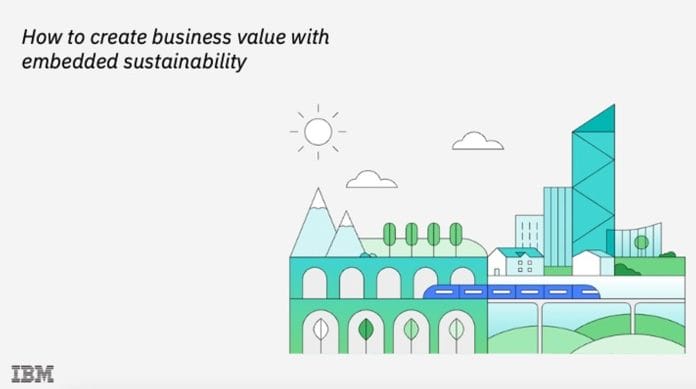This commentary was contributed by Dickson Woo, Country General Manager and Technology Leader, IBM Malaysia
Sustainability has emerged as a top corporate priority in recent months and years. The enhancement in sustainability effort is seen in the government’s Malaysia Madani policy framework, Budget 2024, the National Energy Transition Roadmap, and the New Industrial Master Plan that have all been announced and even approved.
However, why is sustainability not generating more impact for organisations yet? And that after years of ‘practicing sustainability’, most enterprises have still to produce desired outcomes?
What’s good for the world can also be good for business. Yet, six in 10 executives say they have to make trade-offs between financial and sustainability outcomes. Organisations that embed sustainability are more exacting: Some 53% say business benefits are essential for justifying sustainability investments.
The hard truth many C-suite executives are grappling with is that ‘practicing sustainability’ — as most enterprises have — does not equate to actually being more sustainable. Should we end sustainability as we know it, to make way for a new model that delivers positive sustainable impacts and positive financial results?
A recent IBM Institute for Business Value (IBV) survey unveils that 77% of ASEAN organisations, including here in Malaysia, say that sustainability is central to their business strategy, 74% that it drives better business results, and 72% that it can be a revenue enabler rather than a cost center. Yet, despite these views, only 29% report they are incorporating sustainability data and insights into operational improvements to a great extent, and a mere 19% do so with innovation initiatives.
Case in point: according to the research, spending on sustainability reporting exceeds spending on sustainability innovation by 38%. A majority of organisations approach sustainability as something they report on for government compliance or to appease consumers and shareholders.
Doing sustainability differently
‘Sustainability Embedders’ are doing differently to distinguish themselves — to move from ‘practicing sustainability’ to unlocking sustainability’s potential. But how?
First, they do not spend more ‘on sustainability’. Embedders are not buoyed by big sustainability budgets. Instead, they incorporate sustainability data and insights broadly, into other spending and investment decisions. They incorporate sustainability considerations, data, and insights in 22% more of their operational decisions.
Second, they do not ‘do’ more sustainability. Embedded sustainability does not involve larger or more plentiful sustainability-focused efforts and programmes. Rather, these organisations incorporate sustainability into their core operations and transformation efforts. In fact, they are 90% more likely to incorporate sustainability factors into their innovation activities.
Lastly, they do not approach sustainability as something special. For these organisations, sustainability is about long-term business value. They do not follow the money.
Then, what are the three key challenges to sustainable business value?
- The data usability challenge
Executives surveyed including here in Malaysia recognise the importance of data to achieving sustainability objectives; 83% agree that high-quality data and transparency are necessary to succeed.
Yet, despite recognising the link between data and sustainability success, only about four in 10 organisations can automatically source sustainability data from core systems such as ERP, enterprise asset management, CRM, energy management, and facilities management. And a similar share of organisations is able to integrate sustainability insights for decision-making when using these same core systems.
Embedders are better at converting data into sustainability benefits, with 83% more likely to achieve great benefits to sustainable innovation and product/services development from their data capabilities, 44% more likely to achieve great benefits to reduced energy consumption from their data capabilities and 40% to sustainable supply chains from their data capabilities.
- The business integration challenge
Integrating sustainability data and insights into core operations creates a foundation for better business sustainability outcomes.
In fact, IT is one of the functions with the highest level of sustainability integration today, following manufacturing, procurement, customer engagement and finance who rank top. This is perhaps unsurprising since ‘greening IT’ offers many win-win opportunities for achieving cost efficiencies and reduced environmental impact.
For example, with a hybrid cloud platform, it is possible to reduce energy use and costs through optimised workloads and data across an organisation’s multiple cloud environments—whether it be public clouds, private clouds, or on premises. This can drive reduced costs and lower energy and resource consumption.
- The people, skills, and decision-making challenge
Most importantly, successful large-scale transformations have empowered, engaged people at the center. They ensure their sustainability efforts are supported by reskilling and talent development. And they ensure the ‘corporate sustainability’ department and the special sustainability task force have the decision rights to act where it matters.
Generative AI can turn trade-offs into ‘win-win’ situations
Generative AI (Gen AI) can be a game changer for data-driven sustainability. The study listed top five most important areas where embedders use Gen AI for sustainability, which include accelerating innovation, reducing energy consumption, reducing waste, tracking GHG emissions (including scope 3) and managing risk and resilience. In fact, 55% of executives in ASEAN agree that Gen AI will be important for their sustainability efforts, while 72% say they plan to increase their investment in Gen AI for sustainability.
In the increasingly disruptive, complex world C-suites must navigate, one crisis seems to follow the next and sustainability can easily be sidetracked as other priorities take precedence. Sustainability is thus part of a greater evolving fabric of elevated risk and uncertainty. The route to future business value can’t circumnavigate or sideline sustainability. It has to be embedded.
Note: This commentary was contributed by Dickson Woo, Country General Manager and Technology Leader, IBM Malaysia









